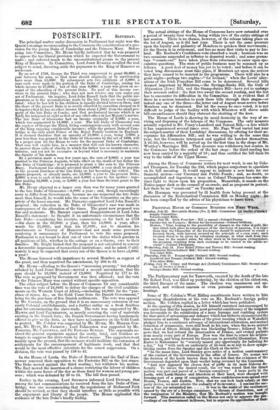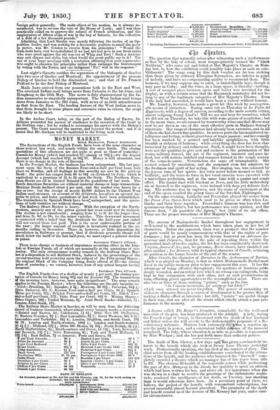the third Baronet of the name. The election was unanimous
and un- Sir Robert Peel, was filled up yesterday, by the election of his eldest son, The Parliamentary seat for Tamworth, vacated by the death of the late contested, and without canvass or even personal appearance on the hustangs.
Some of Mr. Cobden's West Riding constituents have written to him expressing dissatisfaction at his vote on Mr. Roebuck's foreign policy motion. Mr. Cobden replied in a letter which has been published. At the opening of this session, he felt himself sustained and encouraged by the conviction that the largest and most powerful constituency of the kingdom was favourable to the substitution of a more humane and confiding system for that spirit of antagonism and defiance which has hitherto characterized the intercourse of nations. The cheers of the great ?meeting which at Wakefield pledged him to a continued advocacy of international arbitration, and mutual reduction of armaments, ,ere still fresh in his ears, when the news arrived that a fleet of fifteen British ships was blockading Greece ; followed by the news that we had refused the intervention of France, and evoked protests from nearly every part of Europe. Now was the time to renew his arbitra- tion motion, and bring forward the Greek case in powerful illustration. From Easter to Midsummer he "scarcely missed one opportunity for balloting for a day," but "with such an uniformity, of ill-luck as at last to draw syrapa- thi zing smiles from the Speaker and the Clerk at the table." "In the mean time, Lord Stanley gave notice of a motion condemnatory of the conduct of the Government in the affair of Greece. No sooner WaS the decision of the Lords known than it was felt that the existence of the Government depended upon their verdict being reversed by the Commons. "And now appeared the cloven foot of patty in its most hideous de- formity. To insure the desired result the cry was raised that the Cum motion was part and parcel of a 'foreign conspiracy.' A large party in the Lords, with Lords Stanley and Aberdeen at their head, were charged with whose confederates were spread over forming part of a gang of cons Russia, France, and Austria, ow, t at we can look back calmly at this party device, we must admire the audasity of its inventor. I confess the suc- cess of the cry astonished me It was in the midst of the excitement caused by the cry of a foreign conspiracy, by threats of dissolution, and of the resignation of the Ministry, that lib.. Roebuck's motion was brought forward. This resolution called on the House not only to approve the pre- ceedings of our Government in Greece, but to express its approbation of their
foreign policy generally. The main.object of his motion be it always re- membeted, was to reverse the vote of the House of Lords; and I was thus practically called on to approve the refusal of French arbitration, and the employment of fifteen ships of war in the bay of Salami',, for the collection of a debt of a few thousand pounds."
Admitting that Lord Stanley was merely following the tactics of an Op- position leafier, and was seeking for a favourable position to assail the party in power, was Mr. Cobden to swerve from his principles? "Would the Corn-laws have ever been abolished if we had not had men in our front ranks who were proof against the old war-cry of Whig and Tory ? Such a doctrine may suit cliques and clubs, but what would the great public say to it ? Try one of your large meetings with a resolution affirming that your representa- tive ought to abandon his principles rather than endanger the Government by voting with the Tories, and one indignant 'No!' will be the response."



























 Previous page
Previous page